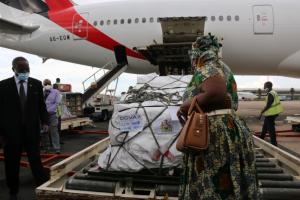WHO emergency teams learning and supporting in Malawi
With Malawi’s top-level leadership fully committed to addressing bottlenecks that are hampering the country’s COVID-19 vaccine rollout, WHO’s emergency ‘surge’ team is on the ground, supporting the national initiative.
WHO consultant Zora Machekanyanga travelled from Zimbabwe last week to join team leader Dr Charles Byabamazima and Dr Caroline Ryan.
They are part of one of the first multidisciplinary teams of specialists being deployed by WHO’s Africa Regional Office to help about 15 countries that are struggling to achieve the 10% vaccine coverage target now, and the 40% fully vaccinated target by the end of the year.
Malawi has a long way to go, having administered just over six doses per 100 people, with only 3% of the population fully vaccinated. But Machekanyanga says it’s not from a lack of perseverance and engagement.
“There’s been a lot of frustration about the stop-start nature of vaccine supply earlier in the year, and they went through a long, dry spell from around March to July. The fact that no vaccines were arriving left the government, health workers and citizens very demotivated,” she explains.
But all that changed as vaccine arrivals ramped up from the end of July, with Malawi receiving around 2.3 million doses from the COVAX Facility, the African Union Vaccine Acquisition Trust (AVAT), and via a donation from India.
Machekanyanga says the WHO team got some important first-hand lessons in how Malawi, as a deeply community-driven country, is recognizing and leveraging the value of local outreach to ramp up its vaccination statistics.
“We found that, from the very highest tiers down to community level, players in that country are joining forces to find ways to reach people wherever they may live, and however far from the big centres they may be. This kind of political will was very heartening to witness for us all.”
The team kicked off their efforts with a review meeting to identify the strengths and weaknesses of the rollout effort, so they can offer meaningful support where it’s really needed. They also conducted a range of field visits to hear directly from health workers and community leaders about their primary challenges, and to observe engagement activities under way at vaccination sites.
WHO has provided financial and technical support to the Ministry of Health to conduct risk communication and community engagement in seven districts in Malawi. The team is working with local traditional and religious leaders to build their capacity as vaccine champions to debunk myths and misinformation on COVID-19 vaccines.
“The mission may have come to an end, but our work in Malawi is far from done. We may not be there on the ground, but we will continue supporting their efforts to implement our recommendations, and reach that 10% coverage target as soon as possible,” says Machekanyanga.



